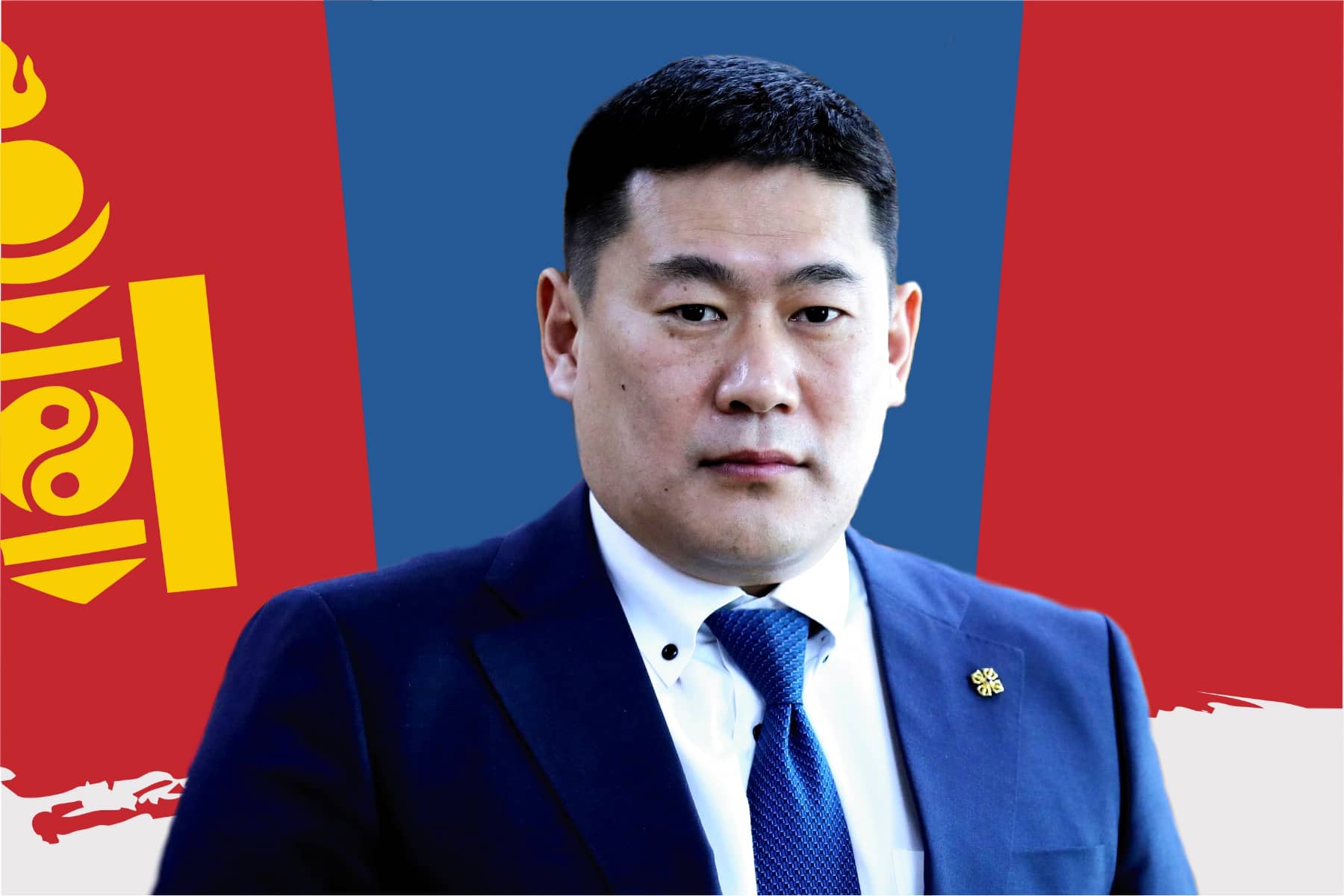

Congratulatory message to Prime Minister Oyun-Erdene Luvsannamsrai
Saturday, 30 January 2021


Saturday, 30 January 2021
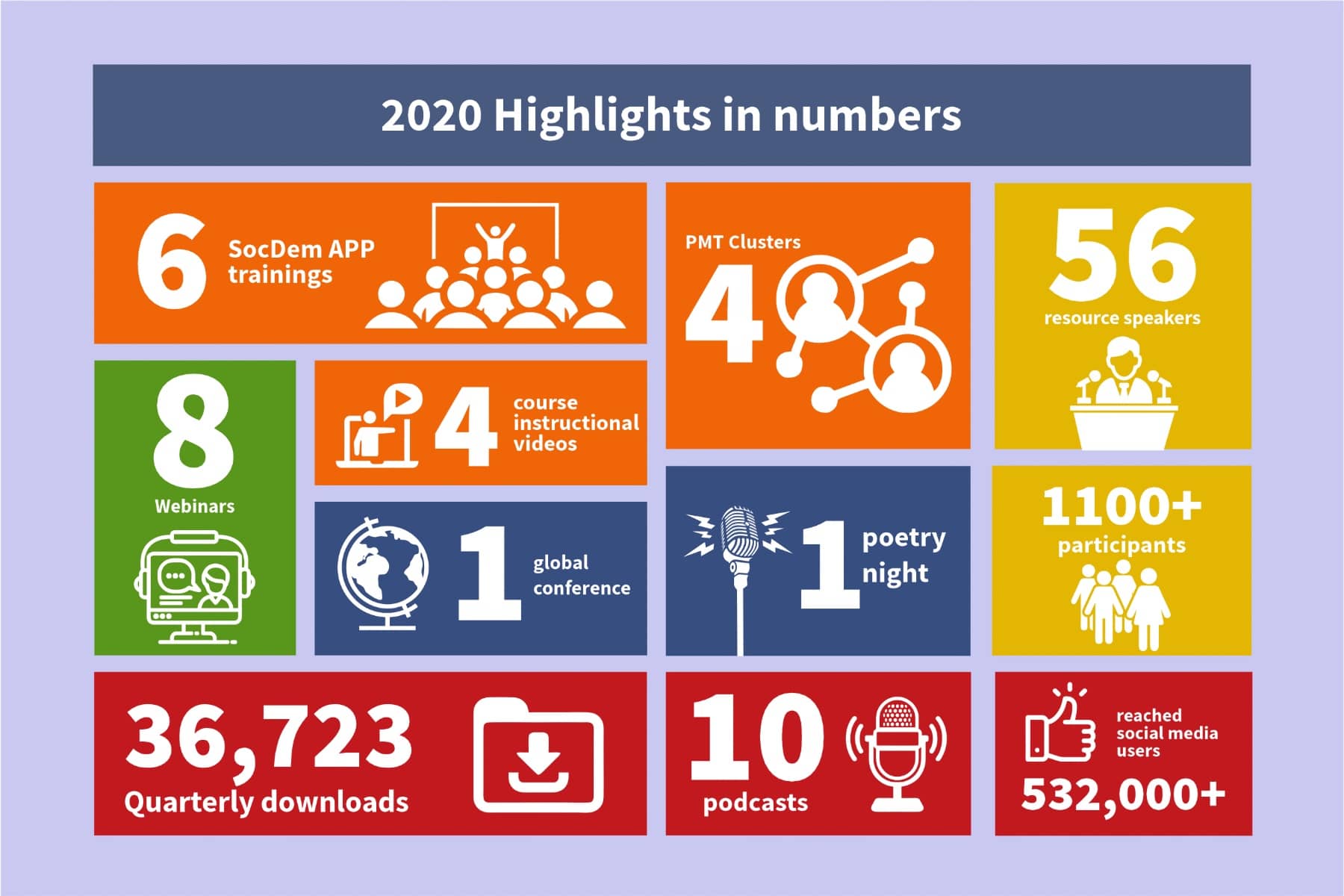

Tuesday, 12 January 2021
View PDF - SocDem Asia 2020 Highlights
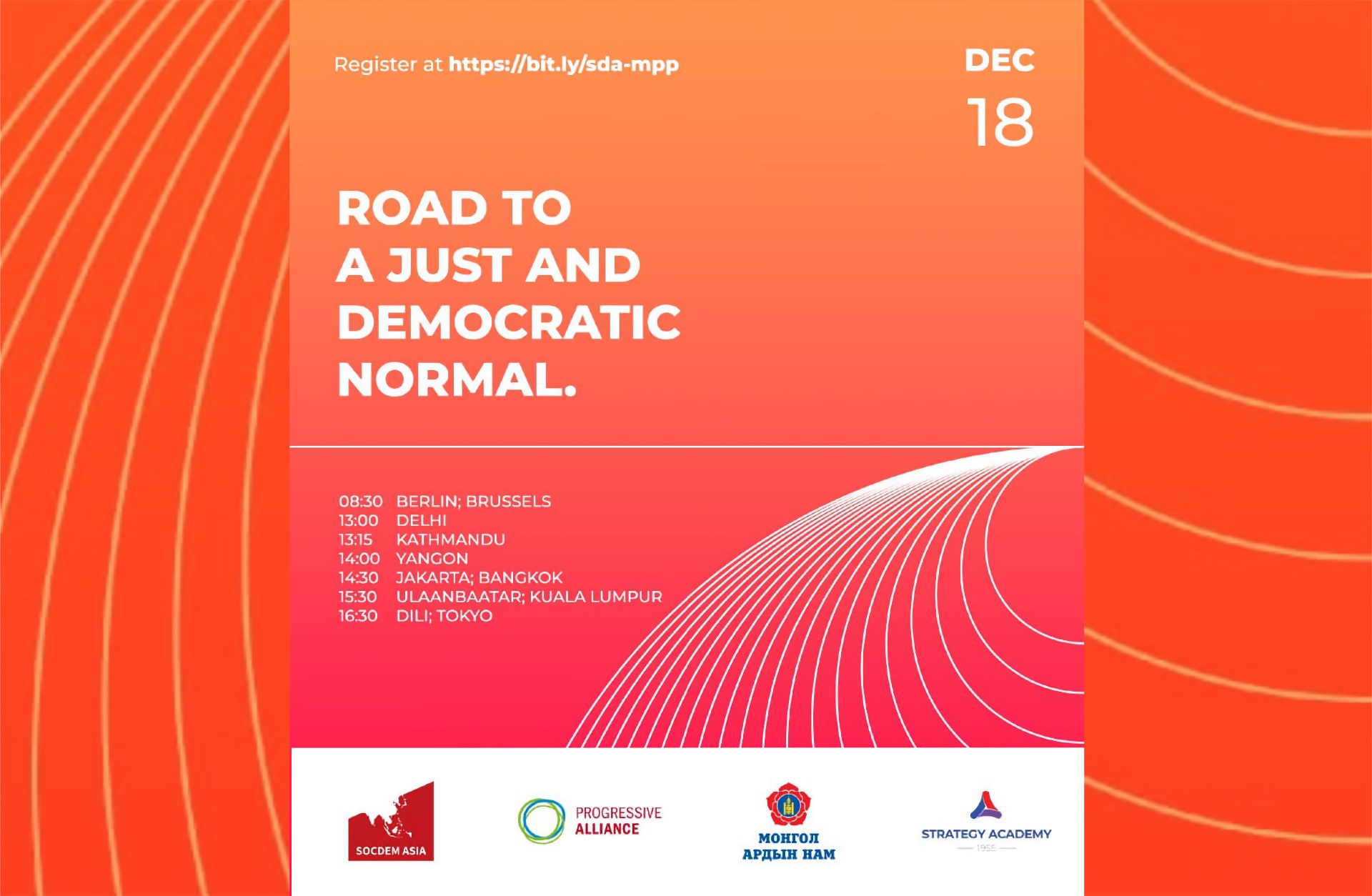

Friday, 27 November 2020
The Mongolian People's Party Secretary General Amarbayasgalan Dashzegve invites everyone to attend the online Conference "Roadmap to A Just and Democratic Normal" hosted by the MPP and co-organized with the Network for Social Democracy in Asia (SocDem Asia) and the Progressive Alliance (PA).
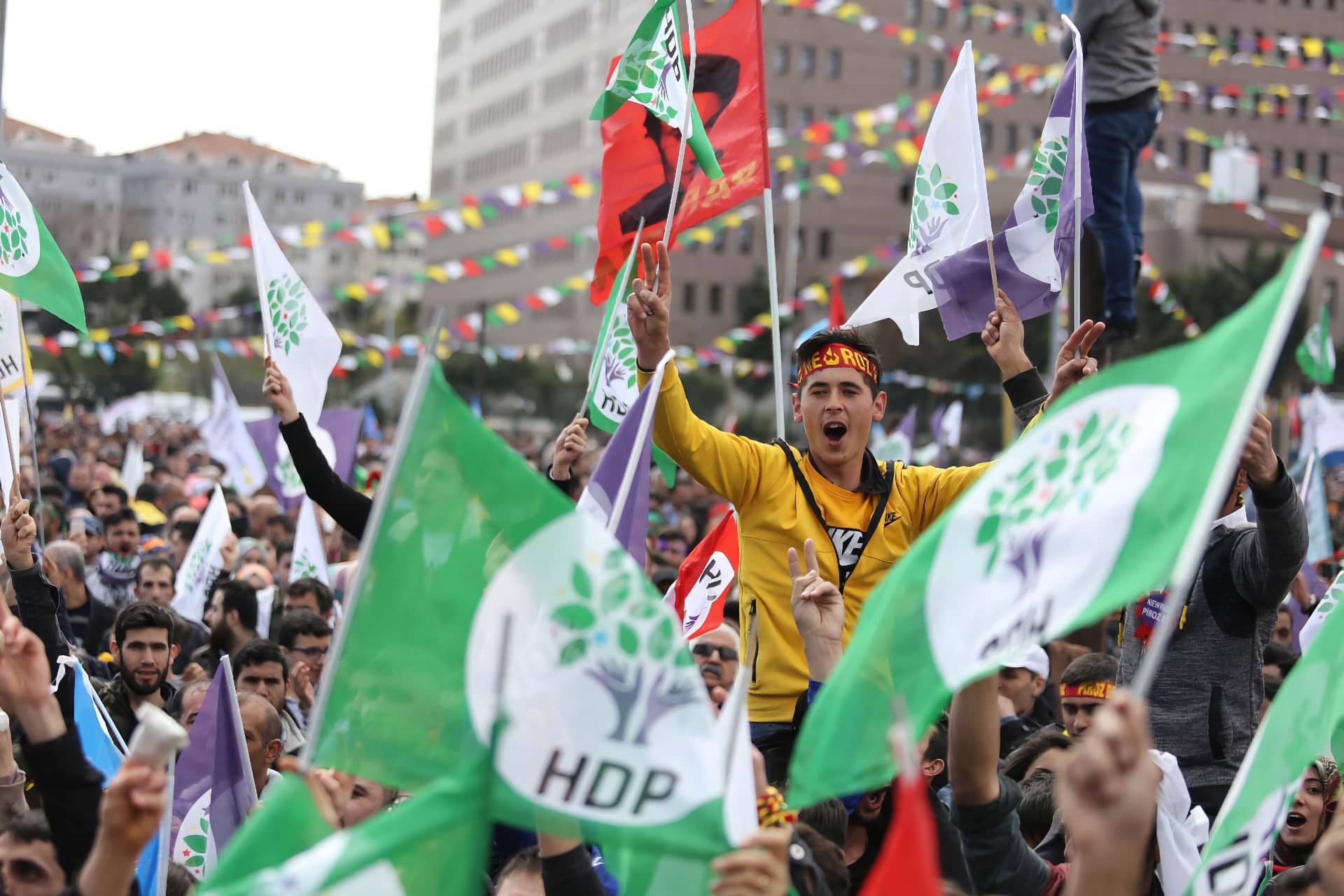

Friday, 2 October 2020
The Network for Social Democracy in Asia (SocDem Asia) condemns the recent wave of arrests conducted by the Turkish government against members and leaders of the Peoples' Democratic Party (HDP). Last 25 September, the government’s chief prosecutor issued arrest warrants for eighty-two (82) individuals affiliated with the HDP. This is part of the ongoing campaign by the government of President Recep Tayyip Erdogan to stifle opposition in the country especially directed at his most persistent opponent, the HDP.
Saturday, 12 September 2020
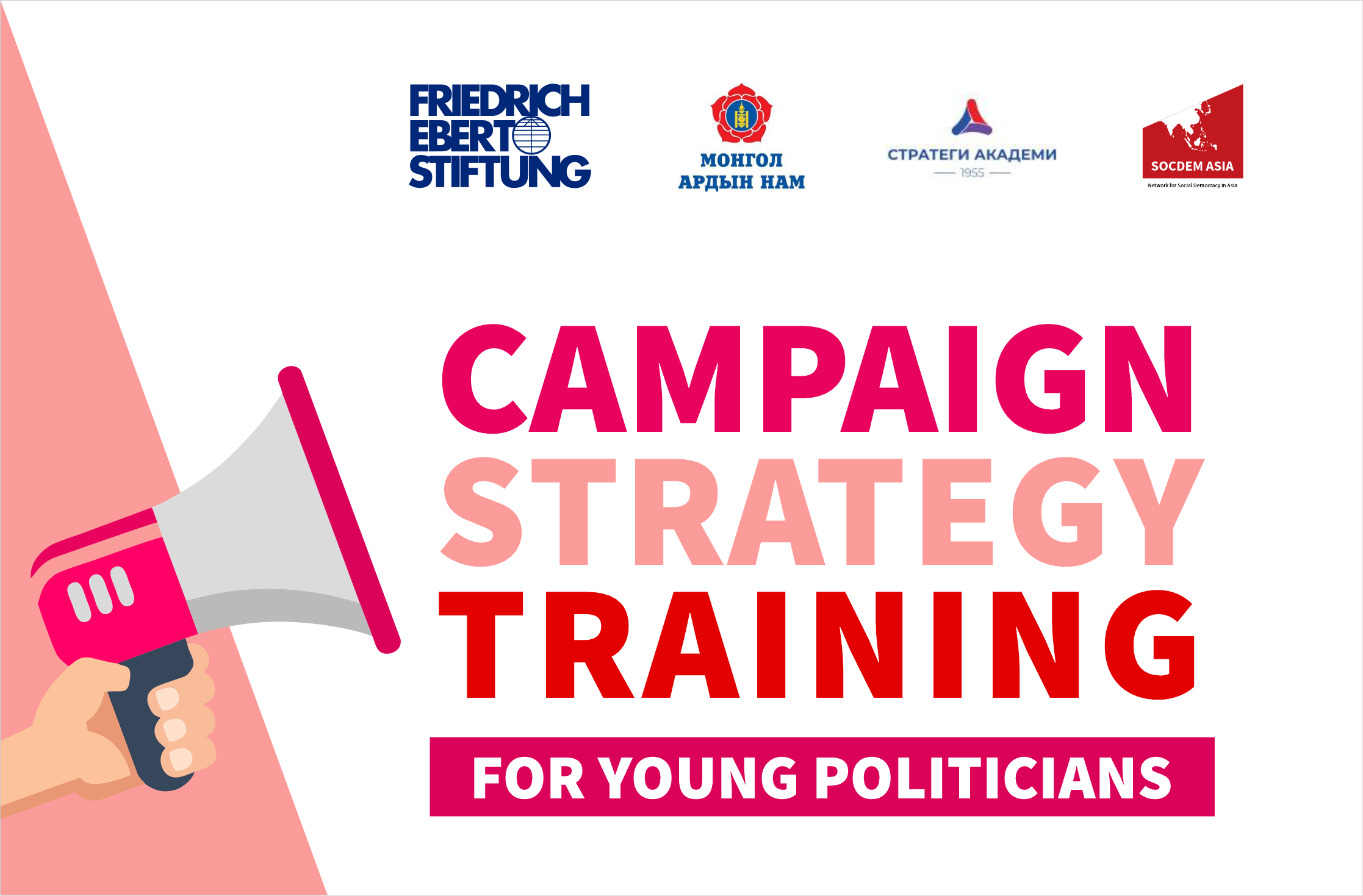
The Network for Social Democracy in Asia (Socdem Asia), in partnership with the Mongolian People’s Party (MPP), Strategy Academy and the Friedrich-Ebert-Stiftung (FES) Mongolia Office recently conducted an onlline training for young candidates from the MPP who will contest the upcoming October local elections.
Seeking to contribute to the political strategy development of its member parties under the framework of “Transformative Changemaking” (TCM). Responding to a request from the MPP, Socdem Asia developed this tailor-fitted series of Campaign Strategy Training for Young Politicians. Participants were given basic training on mappig the prevailing youth discourse under the framework of Transformative Changemaking (TCM), Basics in political communications and elements of a campaign narrative, and on the campaign phases and infrastructure as well as on volunteer management.
Socdem Asia recognizes that it is essential for progressives to reinvent themselves with new ways of building up a societal base that tips the balance of power toward transformation. This demands new methods for building up social support, reaching out to the untapped constituencies, consolidating around a narrative and a concrete action-oriented project that exemplifies the kind of politics progressives espouse and practice.
Wednesday, 12 August 2020

The Network for Social Democracy in Asia (SocDem Asia) partnership with the Olof Palme International Center, this online training was conducted to help political party educators from the member parties of SocDem Asia on how to integrate the use of online tools which have now gained widespread use because of the COVID-19 pandemic and the measures undertaken to address it. The training looked into digital and online tools such as Slack, Zoom, and others which can be utilized to create a good learning experience for trainees.
The training focused on increasing the capacitites of parties in conducting qualitative online trainings and academies such as on knowledge of how to plan and design for effective learning online, understanding of several online learning tools and their most common features, understanding roles and responsibilities that are required to lead and conduct online learning, and designing and facilitating inclusion, participation and the use of a group’s collective intelligence and experiences.
Participants were from Indonesia, Thailand, Philippines, Malaysia, India, Nepal, Mongolia, and Timor-Leste.
Saturday, 8 August 2020
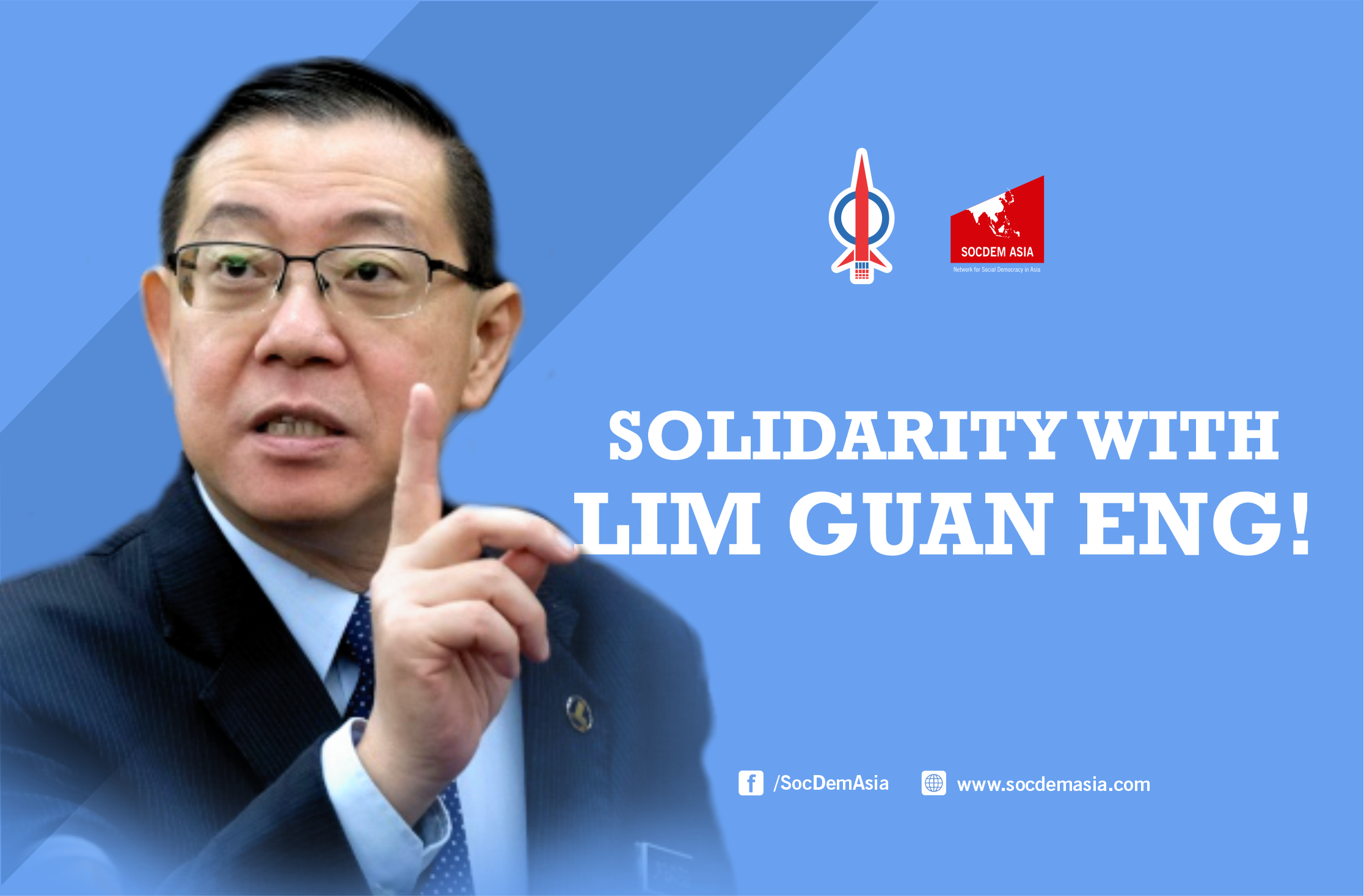
The Network for Social Democracy in Asia (SocDem Asia), a regional network of social democratic and progressive political parties condemns the recent arrest by the Malaysian authorities against Democratic Action Party (DAP) Leader Lim Guan Eng. It is clear from the circumstances that his arrest is politically motivated and part of an overall attempt by the government to silence the democratic opposition.
We stand in solidarity with our sister party the DAP on its fight for transparency, justice and progress for Malaysia.
Mr. Lim Guan Eng's arrest was effected on the evening of Thursday, August 6 based on charges similar to those which have previously been dismissed by the judiciary. It is clear that this arrest is tantamount to political prosecution.
This case is proof of ongoing efforts to discredit the Pakatan Harapan (PH), the broad alliance of democratic parties in the country elected by Malaysians in 2018. We are alarmed that such moves are underway for the arrest of other high-ranking leaders of PH with the objective to render the opposition leaderless going to the next elections touted to be called very soon.
If such efforts by those currently in power were to be successful, all reforms initiated by the former PH government will be reversed or erased. They will also ensure by all means that forces not aligned with them will never return to government.
It is saddening that the mandate given by voters in 2018 for a clean, representative, and democratic government has been subverted since the usurpation of power by the present ruling coalition (a coalition of remnants of the UMNO political machine, political opportunists, and the reactionary elements of Malaysian politics) late last year.
We urge the Malaysian people and the democratic opposition to close ranks and remain vigilant against any attacks on civil liberties. It is saddening that this has occurred less than three years since Malaysians succeeded in voting out of office the corrupt regime of the convicted former Prime Minister Najib Razak. The current ruling government has shown it has no qualms of replicating the same tactics of political harassment and intimidation perpetrated by the corrupt UMNO-led government. ###
Tuesday, 7 July 2020

Gio Tingson (26 June 2020)
Like watching the never-ending seasons of The Walking Dead, president Duterte has once again extended community quarantine. I first heard the term “new normal” in 2010 when Bagyong Ondoy (Typhoon Ketsana) hit Metro Manila. What was once a concept communicated by disaster experts, day by day, becomes a global reality. This pandemic is unprecedented; it has affected our economy, our rights, our way of life. In doing so, it has exposed much about the fundamental challenges the regimes present; the political communities we belong to; and, for many, the weaknesses of the authorities who govern us.
Foreign and global economies have been hit hard because of this pandemic. For exam-ple, the United States federal government released a $3 trillion stimulus in just 3 months as a response to COVID-19. The IMF projects a negative growth of the world’s economy at -3% in 2020, three months into this global lockdown. In comparison, during the 2008 global financial crisis, the US then spent $6 trillion in a span of 6 years in around 3 major stimulus packages. That year, IMF’s global growth prediction was only -1%.
In the Philippines, The DBCC projects the country's Gross Domestic Product (GDP) to contract by 2.0 to 3.4 percent in 2020. I remember during the 2008 financial crisis, my father had to opt for early retirement as their company was downsizing globally. To date, the Philip-pines’ unemployment rate rose to 17.7% from 5.3% in January, accounting to 7.3 million un-employed Filipinos in the labor force as of April 2020.
A crisis of this scale has been used and abused by leaders to cling to power. Following next generation heads of state, El Salvador’s then-celebrated millennial populist president Nayib Bukele has implemented one of the most aggressive strategies to contain COVID-19. Like the Philippines, he ordered a national quarantine in early March. When his country’s leg-islature met to override his veto of a bill that would repatriate citizens stuck abroad, a deputy of his coughed and minutes later, he tweeted that his epidemiological team “had detected a signif-icant suspicion of COVID-19” in the chamber and that it should be shut down. This caused pan-ic prompting lawmakers to leave the assembly and thus losing quorum. President Bukele has a 90% opinion poll approval in handling the pandemic despite use of brute force and human rights violations.
Is this opinion the same for President Duterte? A look at the recent Social Weather Sta-tion survey, while being mindful of its new methodology (as of writing, we are in the 12th bul-letin release of this cycle), there are similarities. The SWS hunger report during Community Quarantine is indicative or can be interpreted that most Filipinos see the government as a major provider of their most basic need – food. This is without nuance to well performing Local Chief Executives. So, to my mind, the president might still get the approval of many in handling this crisis, in contrast to the bubble in one’s online wall and some facts on the ground.
More than domestic affairs, this pandemic has also exposed the underpinnings of the world order. The Chinese Communist Party propaganda machine has declared victory over COVID-19 and has been showing goodwill and support to its partners and nations affected by the crisis- take Italy and the Philippines as examples. Yet, as the country seeks to further estab-lish its global stature, it continues to curtail the rights of the people in Hong Kong, manages to clash with India in its physical borders, and persists to build structures in the West Philippine Sea, violating international law.
But with COVID-19 originating from Wuhan, there has been a push back. Vietnamese distrust of China paved the way for a successful COVID-19 strategy by banning flights from the country early on. South Korea’s Samsung has decided to pull-out of China and the Japanese government gives incentives for its businesses to relocate into the domestic market.
On the Western hemisphere, we see the US unraveling domestically. This pandemic, alongside a trade war, and the recent release of top 20 Chinese firms it says is military con-trolled, might be headed into what a political analyst shared as a “Thucydides Trap.” When a great power threatens to displace another, war is almost always the result.
As pointed out by the international community, the Trump administration has been pull-ing out of its international commitments. Recent reports show how China’s stature is growing along with its contributions in the United Nations. It now pays 12% of the UN budget compared to 1% in 2000. Its diplomats head four of the UN’s 15 specialized agencies while America only has one.
The Economist cautions, “if other countries do not act, the system will come to reflect China’s expansive views of national sovereignty and resistance to intervention, even in the face of gross human-rights violations.” As many await the results of the US elections, Xi Jinping’s political calculations are more crucial than ever because a simple misstep could also force a heavier hand from the United States in the regions the Chinese demonstrations its presence as the pandemic happens.
Feeling the major rebalancing efforts shaking the globe, some say not all shaking is bad. Shaking lets us know if we have strong foundations, it brings about what the essentials really are and who are important to us. That is why the Rodrigo Duterte-Xi Jin Ping relations will be put to a test. Will China proportionately respond as how President Duterte has given his heart and soul to Xi?
Okay, so where do we situate ourselves on this spectrum of success and failure in han-dling the COVID-19 crisis?
In the Philippines, the Duterte administration boasts of implementing an early lockdown on major parts of the country including the nation’s capital. But a lockdown is not an end-all-be-all approach; it is only a temporary solution, to buy time in adapting and responding to the pandemic. In 100 days of lockdown, the government continued to prove to its people its unpre-paredness, shortsightedness, and incompetence in dealing with a crisis.
No mass testing was done. Flights from China, at the time the epicenter of the pandem-ic, were not suspended early on. Hospitals were not equipped to deal with the increasing num-ber of COVID cases; instead, they deployed military to establish sequential lockdowns and use their military equipment – like helicopters for “surveillance” and dropping leaflets – instead of health interventions as a priority. Transportation and mobility of people were not restructured to adapt to the challenges brought about by the pandemic; instead, we were told to walk kilo-meters just to get to work. The government’s Balik-Probinsya program which aimed to decon-gest Metro Manila inevitably led to an increase in community transmissions and positive cases. The government put business interest to open the economy over people’s lives and quarantine restrictions were lifted without considering that to fix the economy, we must prepare and fix health conditions first. To top it all off, the blame was placed on its citizens when in fact they basically tried to wait this pandemic out, hoping things would get better, not offering any real and comprehensive action plans. To ordinary citizens left to fend for themselves, this is sur-vival of the fittest at its finest.
Even amid the pandemic and all their mishaps, Duterte has maintained his subservience to China. Duterte insists that if a vaccine is developed by China, the Philippines has better ac-cess to it than other countries. During his late-night fireside telecasts addressing the public on the government’s COVID-19 response, he would end by giving China sweet nothings. And while our country continues to fight for its claim over the West Philippine Sea, the head of the Armed Forces of the Philippines personally wrote to the Chinese ambassador requesting for a Chinese medicine he was given as treatment when COVID hit him. Talk about a compromised head of the military while soldiers are at the frontlines defending our territory against the Chi-nese government.
To date, the longest lockdown of over 100 days has produced 38,511 cases of COVID-19. Presidential spokesperson Harry Roque called this a win when it did not surpass University of the Philippines’ projection of 40,000 by the end of June. As the government celebrates, un-mistakably, it is COVID-19 that won over the Filipino people. We find ourselves on the side of failure and incompetence on the spectrum of global response to this pandemic.
I cite the three obvious observations on this matter:
First: the approach to this pandemic is classic Duterte. Just as he did with his declara-tion on the war on drugs, his policy approach to the COVID-19 pandemic is textbook law and order (Oplan Tokhang as they call it), instead of looking at the pandemic as a public health problem requiring a major public health response.
The government’s crisis team created to respond to COVID-related matters is mainly composed of current and former military officials. In Cebu, one of the country’s major cities affected by COVID-19, the intervention of the President is to assign a former military general as a liaison and deploy police and military battalions in the areas. It paints a picture that bullets will kill the virus. This emphasis on law and order manifests in a lack of actual health-oriented actions. 100 plus days in lockdown and the public cry for mass testing continue to fall on deaf ears. Government claims that the country’s testing capacity is close to 60,000, but actual tests conducted per day is at a 15,000-16,000 only.
This law and order approach is far from just. Like Duterte’s war on drugs, the law on community quarantine has been applied selectively. In the war on drugs, the poor have been the police’s target instead of the drug lords and kingpins. In this pandemic, poor public transporta-tion drivers and street beggars are subject to criminal cases and put in prison. On the other hand, if government officials, allies or even the head of the regional police (whose job is to en-sure that quarantine and social distancing protocols are followed by its citizens) violate set pro-tocols. “Compassion and kindness” were words used by heads in place of prosecution of of-fenses.
In truth, just like the war on drugs, the approach of this government to the pandemic has left the poor, the vulnerable and sick behind. Just look at the thousands of stranded Overseas Filipino Workers where some had to live under bridges waiting for transportation to bring them home, or the workers who had to walk for several hours just to get to work, or ordinary citizens who have died without knowing their test results while VIPs have gotten theirs, even expedited simply because they can.
Second: the atmosphere of fear and intimidation is Duterte’s key ingredient. We see how propaganda and lies have been creating a shift in what is “true” and what is “right” with online trolling, misinformation, fake news, and the silencing of journalists and ordinary citi-zens by fear and intimidation.
ABS-CBN, a major media outlet said to be critical of the president was shut down, in the peak of a deadly pandemic where millions of Filipinos rely heavily on the network’s news coverage for information and updates. While the quo warranto petition was dropped against them, the desired effect of closure was attained, and congress will finish the job. On the other hand, Rappler journalist Maria Ressa was convicted of cyber libel, a law that was not yet passed during the time of the online article’s publication. She is forced to pay more bail than Imelda Marcos who was convicted of graft and corruption in 2018. This is without saying we must be wary of corporate and political interest in media. Caught on camera, you see a Speaker of the House of Representatives bragging about buying media interviews and giving set ques-tions.
Ordinary citizens expressing dissent online are censored and intimated with criminal cases against their right to free speech. A teacher posted his frustration against the president and was jailed and filed a case of inciting to sedition; fortunately, the court decided to quash the case. We also read reports of a simple salesman who posted the words (in his dialect): “We know the pattern. Go (president’s aid and now senator) will try to make a scripted request to crazy Digong. Digong (president) is stupid. Digong is crazy.” He was arrested by the police for his alleged “libelous” social media comments and was accused of being in violation of the Cy-bercrime Prevention Act of 2012.
Worst of all, during this pandemic, the government has managed to prioritize an Anti-Terrorism Bill which curtails free speech, detains suspects without the proper warrant for long periods and gives extra powers without check to police and military.
I remember Chomsky: “Look, part of the whole technique of disempowering people is to make sure that the real agents of change fall out of history and are never recognized in the cul-ture for what they are. So it's necessary to distort history and make it look as if Great Men did everything - that's part of how you teach people they can't do anything, they're helpless, they just have to wait for some Great Man to come along and do it for them… Now, the popular per-ception certainly is that violence is greater today – but that's mostly propaganda: that is just a part of the whole effort to make people frightened, so that they'll abandon their rights.”
Lastly: until there is no political alternative, democratic spaces will continue to shrink. To study this point, I share Samuel Huntington’s thoughts that economic conditions create the possibility for democracy while political leadership makes democracy real.
Our economic conditions now are dismal. As I mentioned, unemployment was reported at 7.3 million in April. As the Labor Department (DOLE) belied the projection of the Philippine Statistics Authority saying unemployment is only 69,000, labor groups project it to be at 12 million. Where in South Korea, their stimulus packages set a condition that employers should not retrench or redundate its workforce, in the Philippines, DOLE effectively released an issu-ance allowing employers to renegotiate wages below minimum wage.
In a surprising move, the BSP cut the benchmark interest rate by 50 points to an all-time low of 2.25%, citing the benign inflation environment. Economists had expected the BSP to keep rates steady this month. Foreign portfolio investments yielded a net outflow of $1 billion in May, higher than the $749.84 million net outflow a year ago. That brings a total net outflow of $3.1 billion in the first five months compared to $685 million net outflow recorded in the same period last year. The Bureau of the Treasury has upsized its debt auction for July to P205 billion from the P170 billion program in June, after the offerings had been consistently over-subscribed since April.
Government has also been securing loans from foreign banks. The China-led Asian In-frastructure Investment Bank (AIIB) approved a $750 million loan, while the Asian Develop-ment Bank (ADB) approved a $1.5 billion counterpart loan for the Philippines’ $2.25 billion COVID-19 active response and expenditure support (CARES) program. An additional P436.9 billion is still pending from foreign lenders to augment funds under the Duterte administra-tion’s four-pillar socioeconomic strategy against COVID-19.
Still, income distribution remains inequitable and we must be wary of how deep this crisis can exacerbate the problem. On top of the already blatant inequality in the Philippines, we can expect the wealth gap to further widen. When there is economic growth, businesses will grow with it. But because of slow economic growth, only the established, competitive compa-nies survive; this too will be a survival of the fittest. We will see consolidations of major com-panies and crony capitalism, while the less competitive, the start-ups, the SMEs will have a hard time surviving and is at the brink of being eased out of the market. Effectively, wealth will be concentrated to fewer people. Of course, if you work for those more competitive companies, the crony capitalists, you will gain the wages, but how about the ones unemployed – all 12 mil-lion of them?
Without a doubt, government is having a hard time balancing its budget with misplaced priorities. Washington-based Institute of International Finance said the Philippines was among the emerging markets that would experience "deep recessions" this year, as the public health crisis is far from over. But these economic conditions still grant us the opportunity to change the inherent economic structures that cause this economic crisis in the first place – a possibility for democracy, as Huntington said.
But the essence of this third point is on making that democracy real. Is there a strong political opposition who can lead the fight against against Duterte and his allies? People ask if there would even be elections in the Philippines in 2022, considering Duterte’s track record of ignoring democratic processes. While my fervent answer as an idealist of democracy is ‘yes’, I believe I can also say ‘yes’ pragmatically. If there is no strong opposition against this regime to fight in the next elections, it’s an easy win for the administration. So, if I were in the Duterte camp, I’d push to conduct elections as a show of a fresh mandate – it’s sure win anyway. Only until Filipinos find those unifying leaders will our democratic spaces and our country be safe for ordinary citizens.
To end, let me go back to Chomsky, who says, “Given the state of the popular move-ments we have today, we’d probably have a fascist takeover — with everybody agreeing to it, because that would be the only method for survival that anyone could think of….So, you don’t wait for the disasters to happen, first you have to create the groundwork. You need to plant the seeds of something right now, so that whatever opportunities happen to arise…people are in a position that they can do something constructive about it.” “You can’t look yourself in the mir-ror if you don’t do it.”
Democracy comes in waves. I pray that the wave of democracy goes back to the shores of the Philippines.
We must muster all we have to contest the Duterte regime. If we have challenged his desired social order before, we are most definitely called to continue now. We need to protect truthtellers, ensure that our institutions report and give the facts and real numbers. Our task now is to identify strong political leaders or an opposition we can rally around to fight and bol-ster a campaign against the current regime. Only until we find these leaders will our democratic spaces, our country be safe for ordinary citizens.
The government claims that we have had the best response to the COVID crisis in Asia. But the facts do not lie, we are definitely at the bottom. What is so blatantly clear is that the Philippine government wasted the most precious commodity in a crisis: time. But as the pan-demic awakens the global community of the undercurrents, we don’t have any time to waste. In our language, “gising na, pero hindi pa bumabangon;” we must rise and resist
______________________________________
Gio Tingson is lawyer and former Chairperson of the National Youth Commission. Tingson also served as the former Vice Chairperson of Akbayan Partylist.
Friday, 3 July 2020
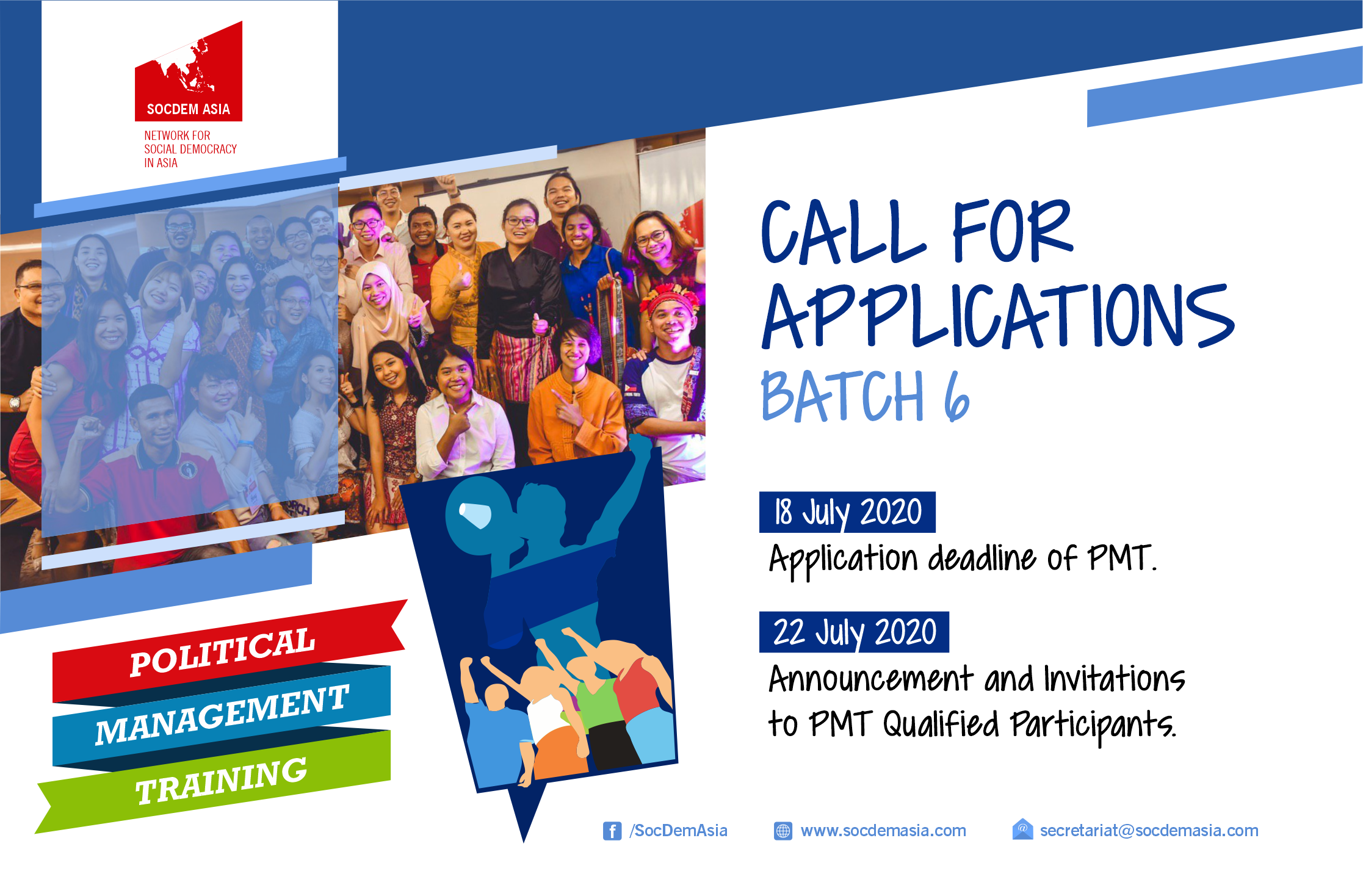
View PDF - PMT Application Form
View PDF - PMT Endorsement FormT Endorsement Form
View PDF - PMT 2020 CALL FOR APPLICATIONS
Background
Southeast Asia is dominated by young population (15-35 years old in average) composing 65% of the 500 million peoples in the region. Given the elitist nature of political systems in Southeast Asia, limitations to political education and participation within the system and unequal opportunities for young people, there is difficulty in accessing programmatic trainings in politics which are often only accessed by established politicians or trade unionists. Political parties and organizations also have difficulty in sustaining training programs because of lack of funding and unfavorable political environment.
Recognizing the need to consistently develop second liners and provide a capacity-building platform for a new generation of progressive leaders, the Network of Social Democracy in Asia (SocDem Asia) developed its own political education and training program. A platform at the regional level where shared learning and collaboration is encouraged, the Political Management Training for Young Progressives (PMT), is an institutionalized regional program that caters to the young, emerging leaders from Socdem Asia member parties. To better cope with and respond to challenges of the times, young progressives are provided with analyses and tools that aid and advancetheir political work.
Since 2011, the training program had over 250 young progressive leader graduates from 7 countries in Southeast Asia who are now working on different portfolio as politicians, policy advisors and party workers at the local and national level. The program also helped launched trans-national solidarity actions and partnerships among these young leaders.
With the challenges to face to face interaction during the time of the Covid19 pandemic, the PMT will be offered this year as a free online training course to selected participants from the region. As with previous PMT courses, the participants will have the opportunity to interact with experts, politicians and industry practitioners. Participants will also be able to earn certificates of completion for each course cluster completed and at the end of the full course be able to graduate from the PMT program. With an updated content and a dynamic, relevant course syllabus, the PMT 2020 online course is planned to cater to the needs of promising young progressive leaders in the region today.
Objectives
• Develop knowledge and skills of and promote social democratic values to young progressive leaders in the region
• Provide a platform where the young progressive leaders can network and build relations with like-minded individuals
• Impart appreciation of cross-country issues and/or agenda affecting the region today
• Incubate collective action or project which the young leaders can share among themselves and to their organizations
Friday, 1 May 2020
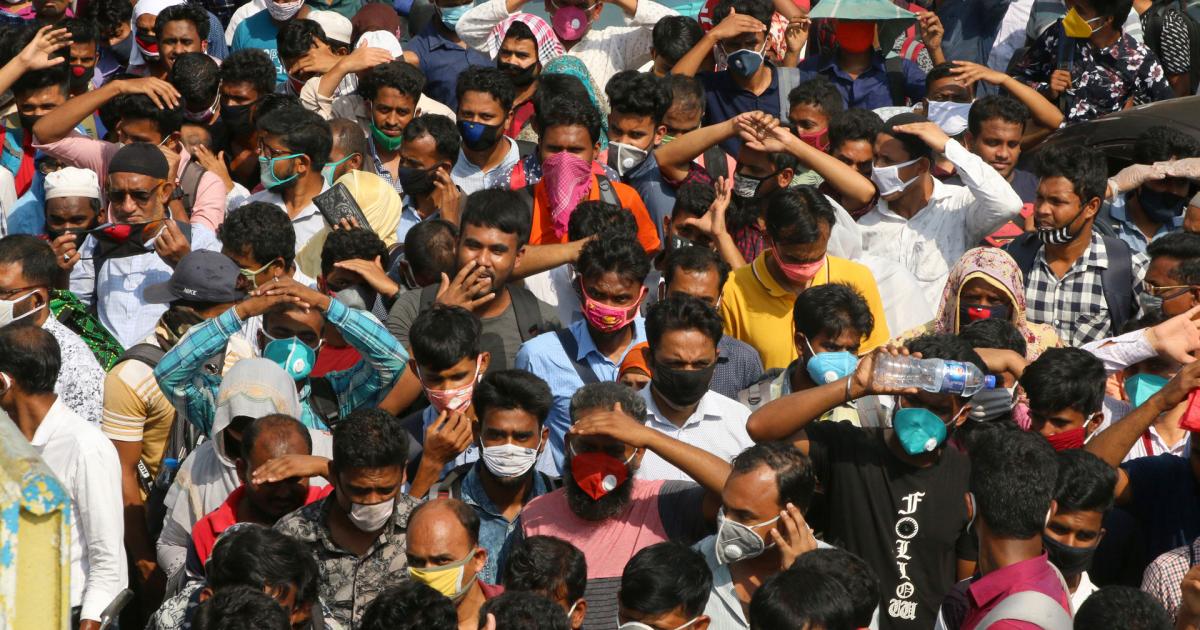
Network for Social Democracy in Asia Statement on International Workers' Day
The COVID-19 Pandemic has now reached a point of overwhelming the world’s health systems and spawning an economic crisis that will reverberate in the years to follow. Such a pandemic of this scale has not been seen since the 1918 Spanish Influenza Pandemic. Despite the pandemic’s global reach, the most affected in terms of health risk and economic dislocation continue to be the working poor of the world. This pandemic has shone a light on a neglected crisis that has persisted for far too long: the crisis of inequality. This is reflected in two parallel currents of inequality that exists under the present conditions, on one hand the vast difference in resources mobilized against the pandemic between the Global North and Global South and on the other hand the inequality in the access to healthcare services between the rich and the poor that exists in these countries. The crisis has affected the working class the most and has shown the vulnerabilities that have existed prior to this pandemic.
As this pandemic continues to infect tens of thousands, world’s leading economies are also feeling the strain. This is leading to the dislocation of millions of the world’s workers to the brink of poverty. Many workers in the Global North can expect some form of wage subsidies from their governments but for the vast majority of the working poor, many who are in contractual work, informal sector work or who are migrant laborers, the pandemic and the stringent measures enacted to slow its spread have practically obliterated months’ worth of income and now threatens to send millions into poverty and hunger. Oxfam’s analysis puts the number of people threatened with hunger at 50 Million just in West Africa alone. The United Nation’s World Food Program further warns that an additional 130 Million worldwide could be pushed to the brink of starvation adding to the almost 1 Billion people who are already facing hunger or worse. Amid this crisis, huge bailouts and economic lifelines are being extended to the wealthiest corporations. And leading the way is the United States, the world’s largest economy, which is coincidentally also has the greatest number of infections.
This obscene inequality should not be tolerated with or without a pandemic threatening the world. It is clear that a multinational and comprehensive health response to this pandemic must also entail an equally ambitious intervention to address the huge inequality that has made our societies more vulnerable to pandemics and health crises.
Lack of Occupational Safety and Protection for Workers, Social Protections
Despite the gloomy prognosis for the next few months, the numerous solutions that have been taken are beginning to slow the spread of the virus. Moreover, essential services such as maintaining peace and order, delivery of foodstuff and medical supplies continue to reach their destinations. These essential services can only continue because health workers and front-line workers have accepted the risk to their health and safety. Governments and societies fitting show of gratitude is to ensure the occupational safety of these workers. Due to the lack of preparedness manifested in the early weeks of the pandemic, many governments scrambled and competed among each other to procure personal protective equipment (PPE). Hospitals and health centers were forced to ration health equipment and PPEs. In many cases, private individuals volunteered to create makeshift PPEs such as facemasks, face shields, and protective gowns to fill in the lack of supply. While admirable, ordinary citizens should not be the main source of PPEs, governments have the duty to provide sufficient PPEs for all health workers and front-line workers in essential services.
Moreover, these workers who are risking their lives should be provided adequate social protections. This must mean proper compensation, mandatory hazard pay and security of employment for these workers. We cannot ask them to endanger their lives and the lives of their families if it means also risking their employment and livelihood.
As this pandemic continues to place tens of millions on home quarantine or social distancing measures, workers in food delivery and transport play an important part in feeding millions. For them, this is not a simple “gig” as the gig economy would suggest. Risking their lives to deliver food and supplies spells the difference between having a job and starvation. Workers in these precarious employment arrangements deserve the security of employment and protection of rights. Workers in the informal sector and migrant workers have to contend the double burden of a health crisis and financial ruin because of lack of employment. Weak labor laws must be retooled to guarantee a minimum social protection for these most vulnerable sectors of society. This must include the revitalization of unions and increase in union membership where unions are already permitted, and legislation to protect workers and the right to organize in countries where such rights are severely curtailed. A true recovery from the pandemic can only be possible with raising the standard of living for workers and the poor and along with it the guarantee and protection of their rights.
Political and Economic Reform
Alongside the immediate protection for our workers, structural reform must also be put in place. Political and economic reform must also proceed. We must take a hard look at the political and economic institutions which have pushed us to this situation.
Now more than ever, democratization efforts are needed to extricate the vast majority of people especially those in autocratic and illiberal democracies from the dangers of continued authoritarianism and populist politics. As shown by responses from the world’s populist and authoritarian leaders, they have failed every metric of effective governance. Instead of listening to constructive criticism from health experts and public policy experts, such autocrats have taken to blaming critics for their inadequacies. In some cases, they have engaged in actual denialism and conspiracy theories thereby risking the lives of millions more. Some, have resorted to unleashing the might of state security forces to put people in check. In the Philippines, after President Rodrigo Duterte ordered security forces to shoot people who violate quarantine rules an army veteran suffering from a mental disorder was shot down by police officers. In Thailand, the military junta’s Prime Minister Prayuth Chan-ocha has used the pandemic to reintroduce sweeping censorship regulations to control the narrative on the pandemic in the country. In Mongolia, the government of President Khaltmaagin Battulga is leaning towards the imposition of emergency powers to address the crisis. In Burma, the military establishment has used the crisis to escalate military action and resume hostilities in ethnic territories. Meanwhile in India, Prime Minister Narendra Modi’s government response is to place more than 1 Billion people under a state of lockdown without adequate provision for their food while security forces have been shown to perpetrate violence against lockdown violators. This lack of transparency and impunity during a pandemic creates a situation for further consolidation and control for autocrats and is ripe for an escalation of abuse.
Instead of a proper response to this health crisis, autocrats are further emboldened to weaponize social distancing and quarantine measures as means to control their people. Violations of civil rights can be justified under the guise of a public health response. An effective solution to the pandemic cannot come out of a regime of abuse. The only viable solution is to foster greater transparency and accountability to allow the public to see the full effect of this health crisis beyond the government sanctioned numbers and to allow them to hold their leaders accountable if they failed in addressing or if they exacerbated the crisis.
While humanity will undoubtedly survive and thrive after this pandemic, the economic systems which have endangered millions and placed millions more vulnerable to economic ruin, starvation, and abuse should not be permitted to survive. Neoliberal capitalism and its proponents in the North and South have been responsible for severe policies of privatization, and austerity have gutted public health systems and pushed vital health services to become inaccessible to many. A public and universal health solution is incompatible with neoliberal economics. When economic systems are incentive to reward growth, public healthcare is relegated as another commodity that can be attached with a price. It also ensures that crises such as this become a recurring phenomenon. Such cyclical health and economic crises will take a huge toll in human life.
Future Economies and Polities built on democracy, human rights, solidarity and equality.
At this juncture of a health crisis and economic crisis, citizens and their leaders must exercise the political will to reorient and rearrange their economies. This is not unprecedented. During the Great Depression of the 1930s the United States through the New Deal reined in the excesses of its financial market and instituted a jobs program to employ millions in public works programs. Similarly, in post-war Britain, the Labour government of Prime Minister Clement Atlee introduced groundbreaking policies in universal healthcare, accessible housing, and social security. All these policies were done during a period when their governments were still reeling from the aftereffects of economic crisis or war. Even as we speak, government across the globe have been deploying far-reaching relief packages for citizens, which just a few months ago would not be seen as practicable or logical by many.
Workers and the poor should no longer accept the excuse that such expansive social protections are too expensive and are a drain on the economy and national budgets when in fact they are investments on our citizens. Such arguments against social protection policies cannot be justified in times of economic growth when similar policies are being enacted during this time of crisis.
Elements of a future economic system must include:
1. A basic living wage. This will allow many poor workers the ability to lift their families from poverty. This must be set as the minimum standard for workers in the formal sector. Similar arrangements such as government subsidies for informal sector workers must also be extended. A minimum living wage will grant workers more freedom and access to goods and services. This will also serve to increase spending and consumption and thus hasten the recovery of many economies.
2. Universal social protection. A lifeline from governments must be extended to the most affected by the crisis. Those most at risk from the crisis must be given ample protection to survive not only the pandemic but also the looming economic crisis. Protections such as cash transfers, unemployment insurance, work programs, debt relief and other measures must be the minimum standards set in place as safeguards for future pandemics and economic crisis. Such protections must also include retraining and upskilling of workers as a fundamental right of workers to better adapt to the new economy we wish to build.
3. Universal health care. It is necessary to ensure that healthcare becomes a universally recognized right for all. Privatizing health care will only translate to greater disparity and inequality in terms of access to much needed medicine and treatment. A more humane health system must remove profiteering as a driving motive to save human lives. Instead such a health system will mobilize public funds and resources towards healthcare because it is treated as a public good rather than as a private commodity.
A future post-pandemic world must be characterized by solidarity, democracy, human rights, and equity for all people. The current crisis shows deep-seated flaws in our political and economic systems which worsen the pandemic. While the virus may not discriminate based on class, race, ethnicity, or gender, our responses to the pandemic are affected by those innate flaws. The working class are the most in danger of getting sick, going bankrupt, losing their jobs, and falling in debt. This 1st of May is a celebration of the struggles and victories of the workers movement in building a more humane and decent society. This occasion is made more meaningful as we grapple with the multiple challenges posed by this pandemic. The opportunity for creating a better future exists but it is only possible with collective action and persistent struggle. As progressives we know that is the only proven effective strategy and we must now make the decision to take it or let it pass.
###